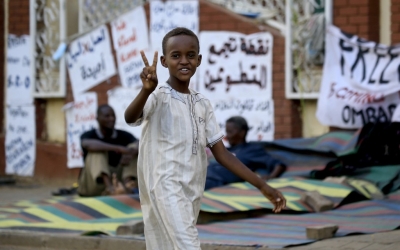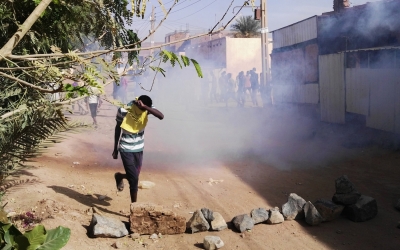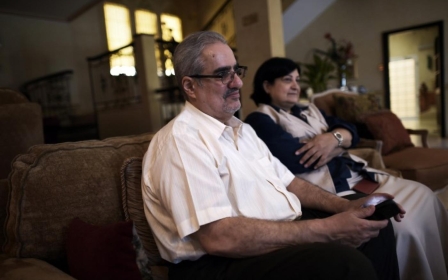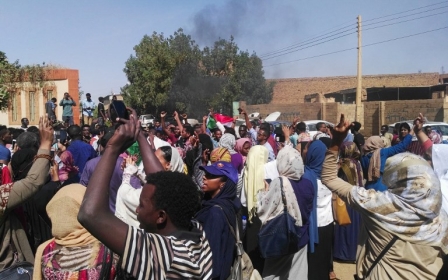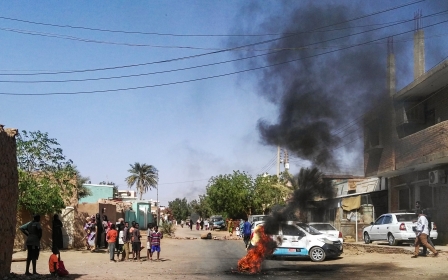Hundreds protest in Khartoum as Bashir promises dialogue with opposition
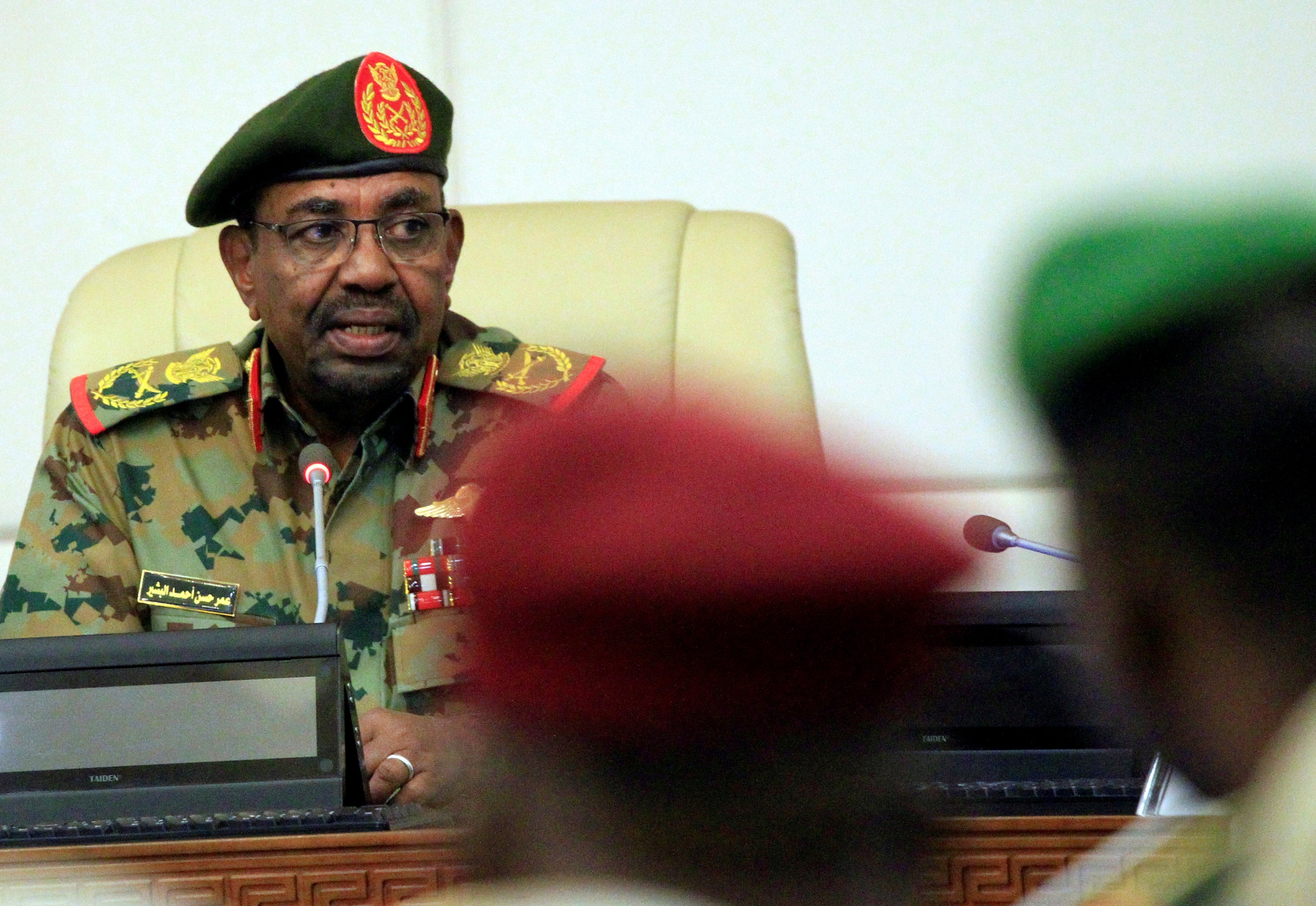
Hundreds of anti-government protests engulfed the streets of Khartoum on Thursday as President Omar al-Bashir said he would seek dialogue with the opposition for the sake of Sudan's stability.
Marching down one of the capital's main streets, more than 200 protesters drew tear-gas volleys from police who also fired tear gas to disperse hundreds in eastern Khartoum who had gathered outside a private university, witnesses said.
In the capital's Burri neighbourhood, one group of protesters that included children chanted "the revolution is the choice of the people," a live video on Facebook showed. Some wore masks as protection from tear gas in the latest in what have become near-daily protests in Sudan since 19 December.
Why are Sudanese protesting against their government?
+ Show - HideSudanese protests have evolved in the space of less than six months from complaints about bread prices to calls for long-term leader Omar al-Bashir to go and demands for a civilian-led transition to democracy.
Here's a summary of the key moments so far since the protests began.
19 December 2018: People take to the streets in the city of Atbara to protest against a government decision to triple the price of bread, torching a local ruling party office. By the next day protesters on the streets of Khartoum and other cities calling for "freedom, peace, justice". Police try to disperse the crowds, resulting in at least eight deaths. Dozens more will be killed in the weeks of protest that follow
22 February 2019: Sudanese President Omar al-Bashir declares a nationwide state of emergency. He swears in a new prime minister two days later, as riot police confront hundreds of protesters calling for him to resign
6 April: Thousands gather outside the army's headquarters in Khartoum, chanting "one army, one people" in a plea for the military's support. They defy attempts by state security forces to dislodge them and troops intervene to protect them
11 April: Military authorities announce they have removed Bashir and that a transitional military council will govern for two years. Despite celebrations at Bashir's demise, protest leaders denounce the move as a "coup" and the protesters remain camped outside army headquarters.
14 April: Protest leaders call on the military council to transfer power to a civilian government
20 April: Sudan's military rulers hold a first round of talks with protest leaders
27 April: The two sides agree to establish a joint civilian-military ruling council, but talks stall over differences in the composition of the council, with both sides demanding a a majority
15 May: With negotiators reported to be close to agreeing a three-year transition to civilian rule, military leaders suspend talks and insist protesters remove barricades outside the army's headquarters. Talks resume on 19 May but break down again on 20 May, with the opposition insistent that a civilian must head the transitional governing body
28 May: Thousands of workers begin a two-day strike to pressure the military rulers and call for civilian government
3 June: At least 35 people killed and hundreds injured, according to opposition-aligned doctors, as security forces firing live ammunition move to disperse the protest camp outside army headquarters
4 June: General Abdel Fattah al-Burhan, the head of the military council, announces that all previous agreements with protest leaders are scrapped and says elections will be held in nine months
Bashir, who has led the country for three decades after taking power in a military coup, promised during a swearing-in ceremony on Thursday that he would talk with the country's opposition as he faces the most sustained challenge ever to his rule.
"Securing peace and silencing the sound of the rifle is our most important priority for the country and we will communicate with the forces who reject dialogue for the sake of political stability," Bashir said, according to a presidency statement.
The 20-member cabinet sworn in was announced only a day before by Sudan's new prime minister Mohamed Tahir Eila who was only sworn in himself on 24 February.
Eila said this new government - the third to be formed in less than two years - would focus on solving the economic crisis that has triggered the anti-government rallies and led to widespread calls for Bashir to resign.
Wave of unrest
Bashir sacked two previous administrations for failing to revive Sudan's economy, and the latest protests were triggered by price increases and cash shortages.
Last month, he declared a state of emergency, dissolved the central government, replaced state governors with security officials, expanded police powers and banned unlicensed public gatherings.
But that has not stopped the protesters, who have held several demonstrations since the new measures came into effect.
As part of the emergency measures, courts have been trying protesters in evening sessions, sparking more rallies outside court buildings. On the evening of 29 February, more than 800 protesters were tried in three separate emergency courts, as MEE reported.
Bashir is wanted by the International Criminal Court over charges of masterminding genocide in the Darfur region, which he denies. He has been lobbying for Sudan to be removed from a list of countries Washington considers state sponsors of terrorism.
The listing has blocked the investment and financial aid that Sudan was hoping for when the United States lifted sanctions in 2017, economists say.
Sudan has been rapidly expanding its money supply in an attempt to finance its budget deficit, causing spiralling inflation and a steep decline in the value of its currency.
Amid the unrest, Qatar Airways announced on Thursday that it would be suspending flights to and from the capital Khartoum.
"Due to commercial reasons, all Qatar Airways flights to/from Khartoum, Sudan will be temporarily suspended effective 31 March 2019 until further notice," said the company in a Tweet.
Middle East Eye propose une couverture et une analyse indépendantes et incomparables du Moyen-Orient, de l’Afrique du Nord et d’autres régions du monde. Pour en savoir plus sur la reprise de ce contenu et les frais qui s’appliquent, veuillez remplir ce formulaire [en anglais]. Pour en savoir plus sur MEE, cliquez ici [en anglais].


